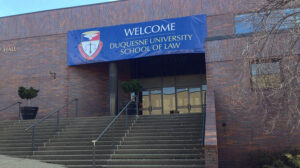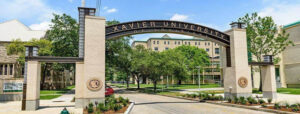Law School, Xavier University of Louisiana Partner on Early-Admission Program
Eligible third-year students at Xavier University of Louisiana—the nation’s only Catholic school among the Historically Black Colleges and Universities—will be offered direct admission to Duquesne University School of Law through a new Early-Admission Agreement between the two institutions. Representatives from the schools virtually “signed” the agreement April 24 via a Zoom meeting.
 Through the agreement, eligible juniors at Xavier who have met established requirements will have the option to bypass their senior year and attend Duquesne University School of Law, finishing both their bachelor and Juris Doctor degrees in just six years, instead of seven.
Through the agreement, eligible juniors at Xavier who have met established requirements will have the option to bypass their senior year and attend Duquesne University School of Law, finishing both their bachelor and Juris Doctor degrees in just six years, instead of seven.
“Our profession shapes societies, forms governments and is the bedrock of justice and rule of law. I believe that being an attorney is a powerful way to make a dent in the world around us,” said Duquesne Law Dean April Barton. “By coming to Duquesne, Xavier graduates will develop the art and skill of advocacy, and learn not only to advocate for issues that they believe in but also for those who are unable to advocate for themselves.”
Xavier University of Louisiana and Duquesne University share similarities in how they were founded and the missions they pursue. Officials at both universities expressed how natural their collaboration is, given the shared heritage and values that animate the work of both institutions. Xavier University of Louisiana was founded in 1925 by Saint Katharine Drexel and the Sisters of the Blessed Sacrament. Duquesne was founded in 1878 by the Congregation of the Holy Ghost.
“We were both founded to give opportunities to marginalized populations: immigrants for Duquesne, African Americans for Xavier,” said Dr. Anne McCall, provost and senior vice president at Xavier. “Our founding purposes remain ever relevant today, and our success is important for the country and the world.”
The agreement also includes opportunities for faculty from both schools to go to each other’s respective institution for scholarly collaboration and teaching.
“This partnership provides an opportunity for Duquesne and Xavier to make a significant impact on the future legal workforce by preparing students to become practitioners of social justice and equity as leaders, experts and change makers within the legal profession,” said Xavier University of Louisiana President Dr. Reynold Verret. “We are happy to partner with Duquesne to offer to our students such a rich program of study, incorporating hands-on research, service-learning and experiential education.”
Duquesne Provost Dr. David Dausey said that programs like the one with Xavier have a generational impact. “Our commitment to students now is an investment that helps to close the equity gap for future generations. This agreement is an extension of the critical work that Xavier does to assist and elevate underserved communities,” Dausey said. “As universities, we are uniquely equipped and positioned to foster inclusive excellence, and we can be powerful change agents in our community.”
Xavier Arts and Sciences Dean Dr. Camellia Moses Okpodu added that she was pleased to be a part of the historic signing, especially during the current global situation. “I was touched that even in the midst of a pandemic, we forged forward to sign an agreement that gives our students a chance to pursue law and work for social justice,” she said. “I am proud that social distancing did not change our desire to be change agents and ‘stand in the gap’ for a potentially life-changing opportunity for Xavier students.”
Associate Provost Dr. Darlene Weaver emphasized the commonalities between the two institutions. “We are academic communities grounded in the shared riches of the Catholic intellectual tradition,” she said. “We share an inheritance of Catholic contributions to the world in art and architecture, philosophy and ethics, medicine and jurisprudence. And, we share commitments to social justice, particularly as those are expressed in solidarity, preferential options for the poor and vulnerable, and collaboration for the common good.”

